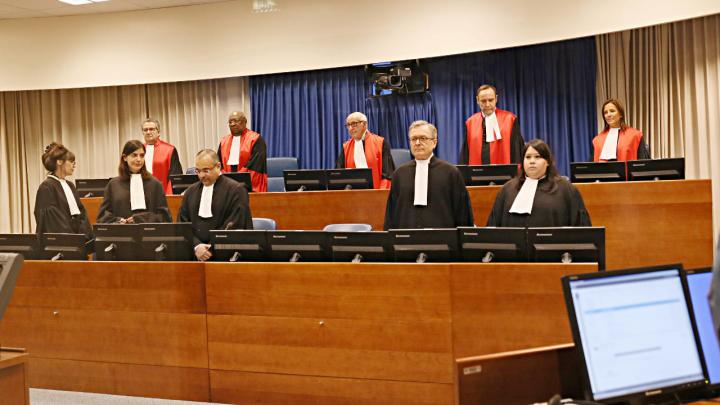The Appeals Chamber of the Mechanism for International Criminal Tribunals hears oral arguments in the Karadžić case

The Appeals Chamber of the Mechanism for International Criminal Tribunals, composed of Judge Theodor Meron, presiding, Judge William Hussein Sekule, Judge Vagn Prüsse Joensen, Judge José Ricardo de Prada Solaesa, and Judge Graciela Susana Gatti Santana heard yesterday and today oral arguments in the appeals filed by Mr. Radovan Karadžić and the Prosecution against the judgement rendered on 24 March 2016 by the Trial Chamber of the International Criminal Tribunal for the Former Yugoslavia (ICTY).
Mr. Karadžić, who was a founding member of the Serbian Democratic Party and, from 17 December 1992, President of the Republika Srpska and Supreme Commander of its armed forces was convicted by the Trial Chamber of genocide, crimes against humanity, and violations of the laws or customs of war and sentenced to 40 years of imprisonment. Specifically, the Trial Chamber found Mr. Karadžić individually criminally responsible through his participation in joint criminal enterprises whose purposes were to: (i) permanently remove Bosnian Muslims and Bosnian Croats from Bosnian Serb-claimed territory in municipalities throughout Bosnia and Herzegovina between October 1991 and 30 November 1995; (ii) spread terror among the civilian population of Sarajevo through a campaign of sniping and shelling from late May 1992 until October 1995; (iii) eliminate the Bosnian Muslims in Srebrenica in 1995; and (iv) take UN personnel hostage in order to compel NATO to abstain from conducting air strikes against Bosnian Serb targets from 25 May to 18 June 1995. The Trial Chamber also found that Mr. Karadžić could be held responsible as a superior in relation to certain crimes committed by his subordinates in Srebrenica in 1995.
The Appeals Chamber granted Mr. Karadžić leave to present arguments in respect of certain of the grounds of appeal during the hearing, and he and his counsel contended that the Trial Chamber violated his fair trial rights and erred in law and in fact in convicting him and in imposing the sentence. Mr. Karadžić’s team requested that his convictions be overturned, or alternatively, that a new trial be ordered or a reduction of his sentence. In its appeal, the Prosecution argued that the Trial Chamber erred by not concluding that Karadžić shared the intent to commit all crimes committed in connection with the permanent removal Bosnian Muslims and Bosnian Croats from Bosnian Serb-claimed territory in municipalities throughout Bosnia and Herzegovina between October 1991 and 30 November 1995 and for not convicting him of genocide on this basis. It further argued that the Trial Chamber abused its discretion by sentencing him to only 40 years of imprisonment instead of life imprisonment.
The appeal hearing in this case was held in advance of projections that it would occur by the end of the second quarter in 2018. At the conclusion of the hearing, the Presiding Judge announced that the Appeals Chamber will render its judgement in due course.